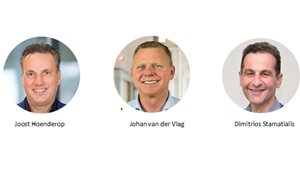 My name is Caro Overmars-Bos, I am Dutch and research technician at the Dept. of Physiology, theme Renal disorders.
My name is Caro Overmars-Bos, I am Dutch and research technician at the Dept. of Physiology, theme Renal disorders.
When you were a kid what did you want to be when you grew up? Can you tell us something about your child years.
I had many different jobs in mind, but all were somewhat “medical”; I wanted to be a veterinarian, a doctor (gyneacologist or in the emergency ward), and later on of course a scientist. You can check with my parents, but I was always asking “why”. I’m guessing that this is the foundation for me working in science now.
What was your previous academic training, where did you study and why that study?
I studied Biomedical Sciences in Nijmegen. I choose Nijmegen because I liked the curriculum here. It is very focused on human (patho)biology, and that is where my main interests lay. My major was (obviously) Human Pathobiology and I did two minors: Genetics and Oncology.
The RIMLS motto is: ‘Today’s molecules for tomorrow’s medicine’. What does this mean for you?
For me that means that I will do my best in each and every experiment, to get the true answer(s) to our research question(s). I truly believe in the proverb “negative results are also results”, because this, even though paradoxically, gives you many answers.
Ultimately, this means that we are one small step closer to unravelling how our cells, organs and complete body work.
Who is your great example as scientists? And please give a motivation why.
I don’t have one specific scientist as my great example. I think we have had many great scientists, and we should all aim to get the best out of ourselves and our research.
Which research discovery that you have made has made you most proud?
There isn’t one specific discovery, but I am very proud of the studies we have performed the last few years, that have resulted in very nice manuscripts!
Given unlimited finance what experiment would you perform?
Given unlimited finance I would like to set up a good functioning immunohistochemistry/immunofluorescence protocol at our lab.
What does your working area (desk, office) look like and what does it say about you (or your research)?
The desk with my laptop is quite empty, which I like a lot. In this way I don’t have many distractions. My lab-bench on the other hand is fairly full! I do a lot of different experiments, using many different techniques, so I like to have everything I need close to my working spot. It is, however, nicely organized (preferably by type and size), so I can easily find everything.
Nominate a colleague to be in the spotlight and what would you like to ask him or her?
I want to nominate Marika Tesselaar!
What type of person are you, quick insights:
a) Mac or PC? : I used to be a PC person, but now I have a Macbook and I’m getting quite fond of it!b) Theater or cinema? : Cinema
c) Dine out or dine in? : Dine in
d) Ferrari or Fiat? : Fiat
e) Shopaholic or chocoholic? : Chocoholic
f) Culture or Nature : Nature
Related news items

Grants for heart and kidney research Two awards to Radboudumc in Open Competition ENW-XS
21 July 2022Two researchers from the Radboudumc receive a grant from the NWO within the Open Competition of the Exact and Natural Sciences. They are Thijs Eijsvogels, who studies the heart, and Pieter Leermakers, who studies the kidneys.
go to page
‘Happiness is in the small things’ a throwback to the valedictory lecture of René Bindels
21 June 2022 In a full Aula he outlined his scientific journey of the past 40 years that led to the groundbreaking discovery of the transient receptor potential ion channel TRPV5 that plays an essential role in maintaining the calcium balance in our body. go to page
ERC Starting Grant awarded to Jeroen de Baaij
17 March 2022 Jeroen de Baaij, kidney researcher the Radboudumc, receives an ERC Starting Grant worth 1.5 million euros. He will use this grant to improve the diagnosis and treatment of severe magnesium deficiencies, which can lead to epileptic seizures and muscle cramps. go to page
Academic collaboration agreement between UTwente and Radboudumc
23 November 2021 The group of Biomaterials Science and Technology (BST) of the Faculty of Science and Technology at the TechMed centre of University of Twente has signed a formal academic collaboration agreement with the departments of Nephrology and Physiology at Radboudumc. go to page.jpg.aspx?width=500&height=333&ext=.jpg&type=BlockColumn1Zoom1)
Genetic mutations cause severe magnesium deficiency
5 October 2021 Newly discovered errors in DNA change diagnostics and treatment. Jeroen de Baaij tracked down new genetic errors that cause magnesium deficiency and published the findings in the Journal of the American Society of Nephrology. go to page
